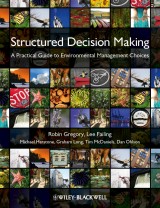Details

Structured Decision Making
A Practical Guide to Environmental Management Choices1. Aufl.
|
56,99 € |
|
| Verlag: | Wiley-Blackwell |
| Format: | EPUB |
| Veröffentl.: | 17.02.2012 |
| ISBN/EAN: | 9781444398533 |
| Sprache: | englisch |
| Anzahl Seiten: | 314 |
DRM-geschütztes eBook, Sie benötigen z.B. Adobe Digital Editions und eine Adobe ID zum Lesen.
Beschreibungen
<p><b>This book outlines the creative process of making environmental management decisions using the approach called <i>Structured Decision Making.</i> It is a short introductory guide to this popular form of decision making and is aimed at environmental managers and scientists.</b></p> <p>This is a distinctly pragmatic label given to ways for helping individuals and groups think through tough multidimensional choices characterized by uncertain science, diverse stakeholders, and difficult tradeoffs. This is the everyday reality of environmental management, yet many important decisions currently are made on an ad hoc basis that lacks a solid value-based foundation, ignores key information, and results in selection of an inferior alternative. Making progress – in a way that is rigorous, inclusive, defensible and transparent – requires combining analytical methods drawn from the decision sciences and applied ecology with deliberative insights from cognitive psychology, facilitation and negotiation.</p> <p>The authors review key methods and discuss case-study examples based in their experiences in communities, boardrooms, and stakeholder meetings. The goal of this book is to lay out a compelling guide that will change how you think about making environmental decisions.</p> <p>Visit <b>www.wiley.com/go/gregory/</b> to access the figures and tables from the book.</p>
Foreword vii <p>Preface ix</p> <p>1 Structuring Environmental Management Choices 1</p> <p>2 Foundations of Structured Decision Making 21</p> <p>3 Decision Sketching 47</p> <p>4 Understanding Objectives 69</p> <p>5 Identifying Performance Measures 93</p> <p>6 Incorporating Uncertainty 122</p> <p>7 Creating Alternatives 150</p> <p>8 Characterizing Consequences 173</p> <p>9 Making Trade-Offs 208</p> <p>10 Learning 239</p> <p>11 Reality Check: Implementation 262</p> <p>12 Conclusion 282</p> <p>Index 289</p>
<p>"I recommend this book to anyone who must function at the interface between environmental science and decision making. Even if you do not have the opportunity to implement the full structured decision-making process, it will give you a better idea of how to think about your role and those of the other parties. The authors write clearly and forcefully." (<i>Integrated Environmental Assessment and Management (IEAM)</i>), 1 October 2012)</p> <p>"I highly recommend the groundbreaking and very accessible book <i>Structured Decision Making: A Practical Guide to Environmental Management Choices</i> by Robin Gregory, Lee Failing, Michael Harstone, Graham Long, Tim McDaniels, Dan Ohlson, to anyone in resource management, risk analysis, land use planning, industry leadership, environmental NGOs, facilitation and negotiation, government, policy making, academia, and undergraduate or graduate studies who is seeking a clear and concise approach to developing workable solutions to even the most challenging environmental problems." (<i>Blog Business World</i>, 13 August 2012)</p>
<b>Robin Gregory</b>, Senior Researcher, Decision Research <p><b>Lee Failing</b>, Principal, Compass Resource Management</p> <p><b>Michael Harstone</b>, Principal, Compass Resource Management</p> <p><b>Graham Long</b>, Principal, Compass Resource Management</p> <p><b>Tim McDaniels</b>, University of British Columbia</p> <p><b>Dan Ohlson</b>, Principal, Compass Resource Management</p>
This book is about the creative and messy process of making environmental management decisions. The approach we describe is called <i>Structured Decision Making</i>, a distinctly pragmatic label given to ways for helping individuals and groups think through tough multidimensional choices characterized by uncertain science, diverse stakeholders, and difficult tradeoffs. This is the everyday reality of environmental management, yet many important decisions currently are made on an ad hoc basis that lacks a solid value-based foundation, ignores key information, and results in selection of an inferior alternative. Making progress – in a way that is rigorous, inclusive, defensible and transparent – requires combining analytical methods drawn from the decision sciences and applied ecology with deliberative insights from cognitive psychology, facilitation and negotiation. We review key methods and discuss case-study examples based in our experiences in communities, boardrooms, and stakeholder meetings. Our goal is to lay out a compelling guide that will change how you think about making environmental decisions.

















